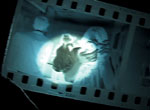Im Go-eun, director of experimental films
 | ||
 | ||
| ▲ Take a Picture (2004) | ||
Im: Take a Picture focuses on the interaction of the photographer, subject and audience. I believe that photographers are domineering when they take photos and that this can distress the subjects. Through this film, I tried to break this violence by showing photos that are twisted, partially hidden or in negative print, thus enabling the audience to independently reconstruct them. The Subjective Documentary about Chinatown deals with my experience as an alien in Chinatown and portrays the definition of documentary and the media world that we are living in which could be full of superficial facts and images.
 | ||
| ▲ Dear. Blackbird (2005) | ||
In 2002, I was in Afghanistan and Uzbekistan to volunteer through KOPION (Korean Pioneers In Overseas NGOs). The 7 months of volunteering was rejuvenating and I truly enjoyed each and every moment. It was also a chance to think about my life. Meanwhile, I took many pictures of children there and one day, it occurred to me that this action could be obtrusive. From then on, I have tried to respect the subject and audience more.
 | ||
| ▲ Subjective Documentary about Chinatown (2005) | ||
Media arts, and filmmaking are actually means of self-expression for me, as I'm very weak at articulating my feelings. I'm also trying to find alternatives for the negative aspects of photos through image language. Take a Picture was an attempt in that sense.
Were there any special episodes in making your films?
The Subjective Documentary about Chinatown was supposed to be an interview with an old hwagyo woman, who had a tumultuous life and was still living in the shabbiest house in Chinatown. One day, I bought some bread and visited her. However, she barely touched it and refused to meet me. On my next visit, she took me to the bakery, returned the bread and gave me back the money. She rejected the interview. I panicked at first but it turned out to be an opportunity to contemplate filming.
Could you share your future plans with us?
It's difficult to answer. A few years ago, I'd have never imagined majoring in media arts. I didn't even like watching movies. However, during one summer vacation, my friend invited me to make an experimental film called Footsteps. I felt ecstatic while I was filming it and decided to study media arts. Now, I enjoy studying and working on films, but I have no idea where I'll be heading in the future. I'll simply believe in and follow what my heart says.
Alfred D. Souza wrote, "Live, like it's heaven on earth," in Love, like You've Never Been Hurt. Im seemed to be the perfect living specimen of this poem. Following her dreams with pure passion and happiness, she is a free spirit. Wherever she is and whatever she is doing, she will be living life and living it as herself. Im refused to be photographed.
| Profile 4th Semester, Graduate School of Comm. and Arts |

